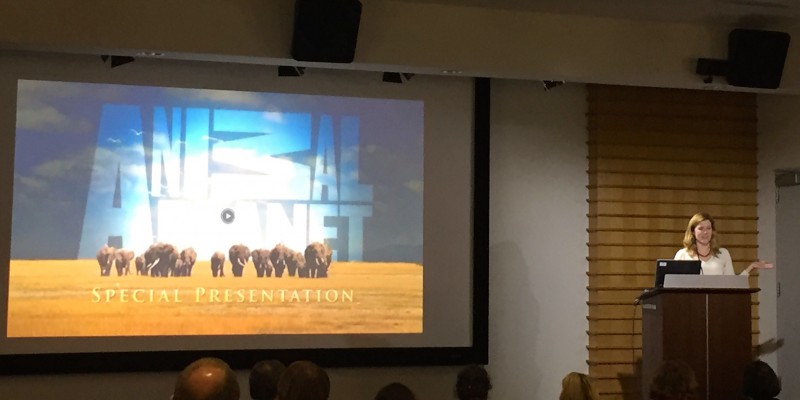Spearheading the campaign against the illegal animal trade
By Dan Roth

Unprecedented demand for ivory and rhino horn is driving prices to record highs while the number of elephants and rhinoceroses in the wild sink to dangerous lows, according to “Animal Planet’s” senior director of production.
Much of the new demand for these products of the illegal wildlife trade has come from China, where the increasingly wealthy middle class has been using newfound expendable income to purchase ivory and rhino horn, which are perceived as status symbols.
“The demand has just gone through the roof,” Erin Wanner, executive producer of “Animal Planet” hit shows, “Pit Boss” and “Fatal Attractions,” said.
The increasing demand for ivory and rhino horn has, in turn, led to a drastic reduction in the number of elephants and rhinos living in the wild.
“The numbers are shocking,” Wanner said. “They are horrifying.”
Wanner spoke to a crowd of roughly 50 people at the Malsi Doyle and Michael Forman Theater Tuesday at American University (AU) about the findings showcased in her recent documentary, “Saving Africa’s Giants With Yao Ming,” which chronicles the effects that the illegal wildlife trade has on animal populations in the wild.
The main problem, according to Wanner, is not the African poachers trying to make a living but instead the consumers who view ivory and rhino horn as status symbols. With her recent documentary, Wanner hopes to change ivory and rhino horn from status symbols to socially unacceptable.
“The new battle against poaching will be fought not in Africa but in the marketplace,” she said.
Part of what she and her crew discovered in making the documentary was the array of misconceptions that consumers have about how ivory and rhino horn is obtained. Thus, it was critical to the mission of the documentary to make sure their message was delivered to the Chinese people.
Perhaps nobody was better equipped to deliver that message than Yao Ming, a native of China and former NBA basketball star and Olympian who turned his focus toward animal rights activism after retiring from basketball.
“He’s just an incredible person,” Wanner said. “The fact that he is using his absolutely epic star status in China — I mean he can’t go out on the street without being completely mobbed — to try to combat the illegal wildlife trade is pretty incredible.”
She said the notion that elephants and rhinos have the ability to regrow their tusks and horns was among the most problematic misconceptions driving elephant and rhino poaching.
This misconception is strikingly similar to another misconception among Chinese consumers that Yao had great success in discrediting — that the sharks whose fins were cut off for consumption in shark fin soup had the ability to regenerate their fins.
Yao partnered with the nonprofit WildAid in a campaign to educate people about the magnitude of devastation to the wild shark population caused by the production of shark fin soup.
Wanner and Monica Zeitlin, “Animal Planet’s” director of marketing, said the campaign against shark fin soup was more successful than anybody had imagined it would be, leading to a more than 50 percent reduction in the number of sharks killed for their fins.
“What Erin gave us as a network was a huge gift: this amazingly powerful story with a really important message,” Zeitlin said. “She even had a celebrity, so it’s kind of a marketer’s dream.”
Still, marketing the documentary required more than just an important message and a celebrity. Along with creating advertisements and promoting the documentary through social media, Zeitlin worked with WildAid to come up with the Ivory Free Pledge so that people could sign up and actively show their support. As of this writing, more than 16,000 people have taken the pledge on WildAid’s website.
Since there are no measurable impacts of the documentary on the elephant and rhino populations as of yet, Wanner and Zeitlin based their preliminary measure of success on both the number of people who took the Ivory Free Pledge and television ratings from its debut.
International television ratings and the number of signatures indicate that the documentary was an international success; however, “Animal Planet” experienced a 5 to 10 percent drop from its average Tuesday primetime ratings in the United States during the initial broadcasting.
Wanner and Zeitlin attribute that largely to the graphic footage of elephants and rhinos after the removal of their tusks and horns. They had considered the impact that such footage might have on ratings and ultimately decided to use it.
“If this is a story about Yao’s journey to see this issue, you can’t shy away from it,” Wanner said.
Still, both acknowledge that the push for ratings plays a large role in shaping the content broadcast on the program and can even be an obstacle in conveying the messages they wish to deliver.
“We as human beings, as stewards of the planet and of our brand would like to see a lot more programming like this on our air,” Wanner said. “But as I mentioned and alluded to, we have to turn a profit, and audiences go to their remotes.”
As a result, Wanner said those seeking to incite change through documentaries must strike a balance between conveying the seriousness of the problem being faced and keeping as many viewers as possible tuned in to the program. “We’re all going to see so many extinctions, unfortunately, in our lifetime,” Wanner said. “It takes all of us to try and do what we can,” Wanner said.
You must be logged in to post a comment.